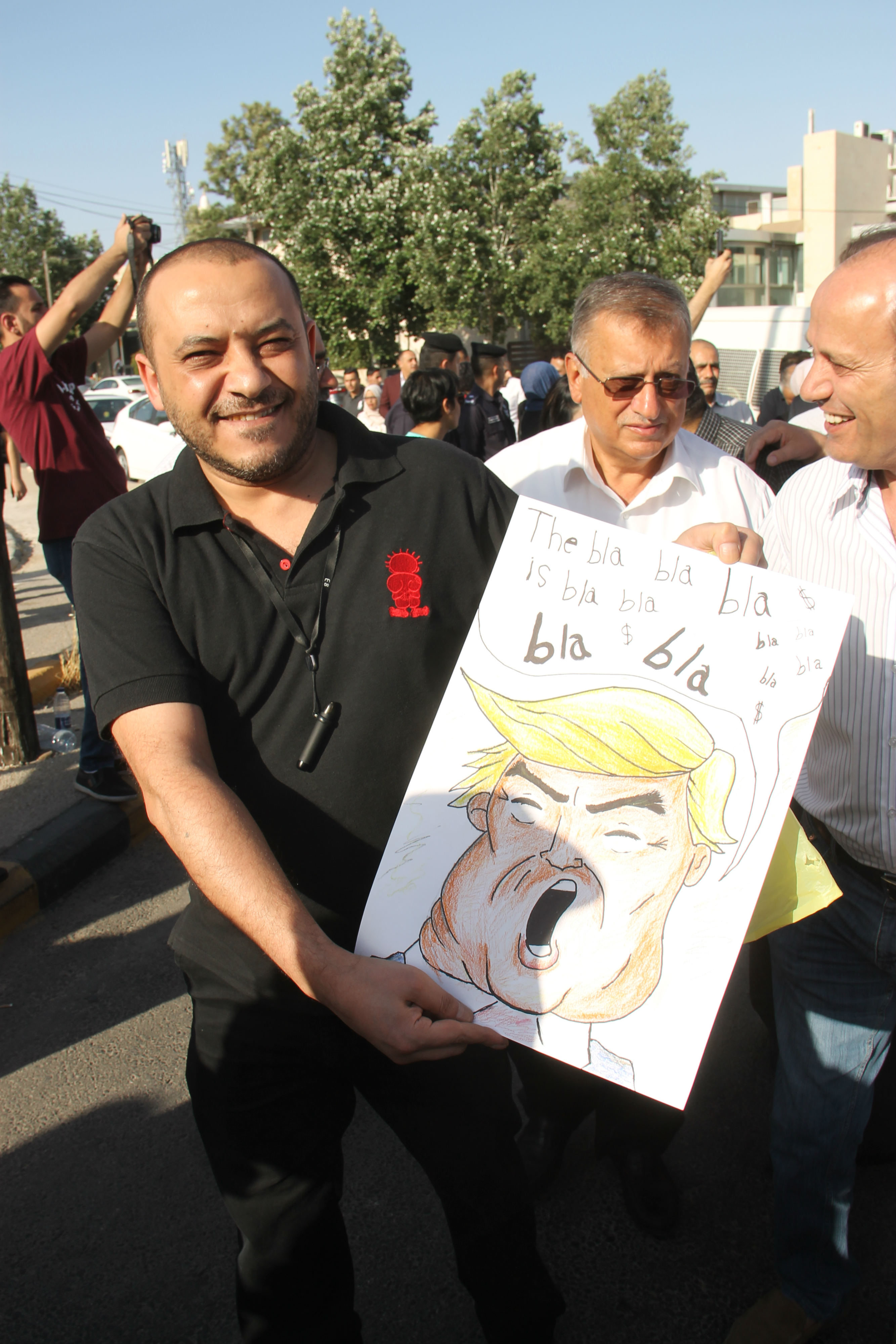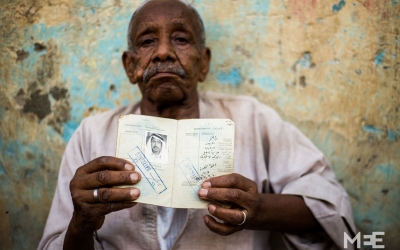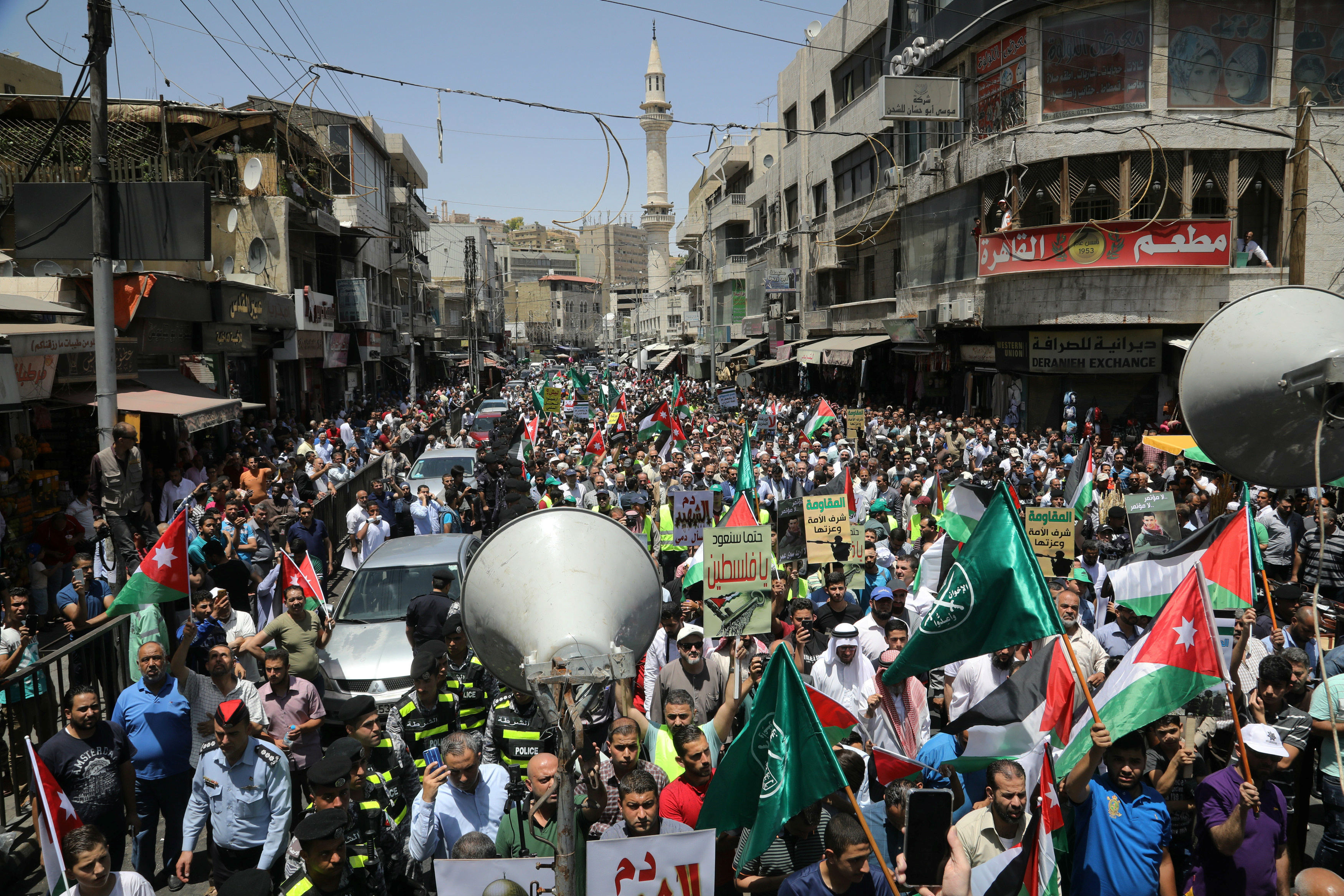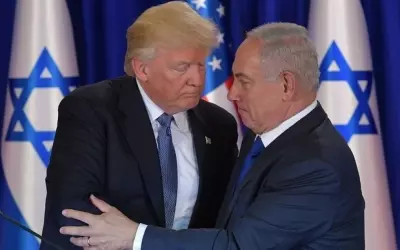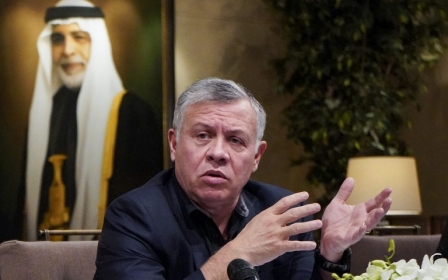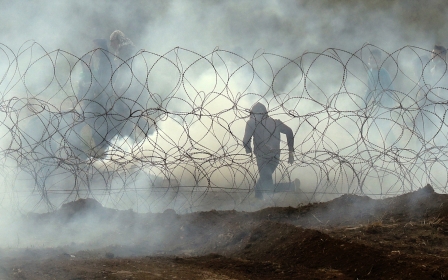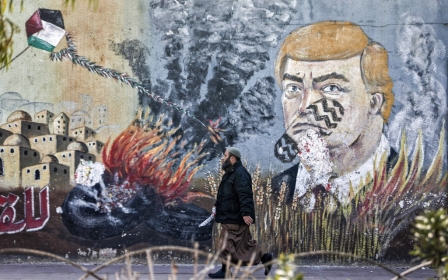Jordanians and Palestinians rally in Amman against Trump's 'deal of the century'
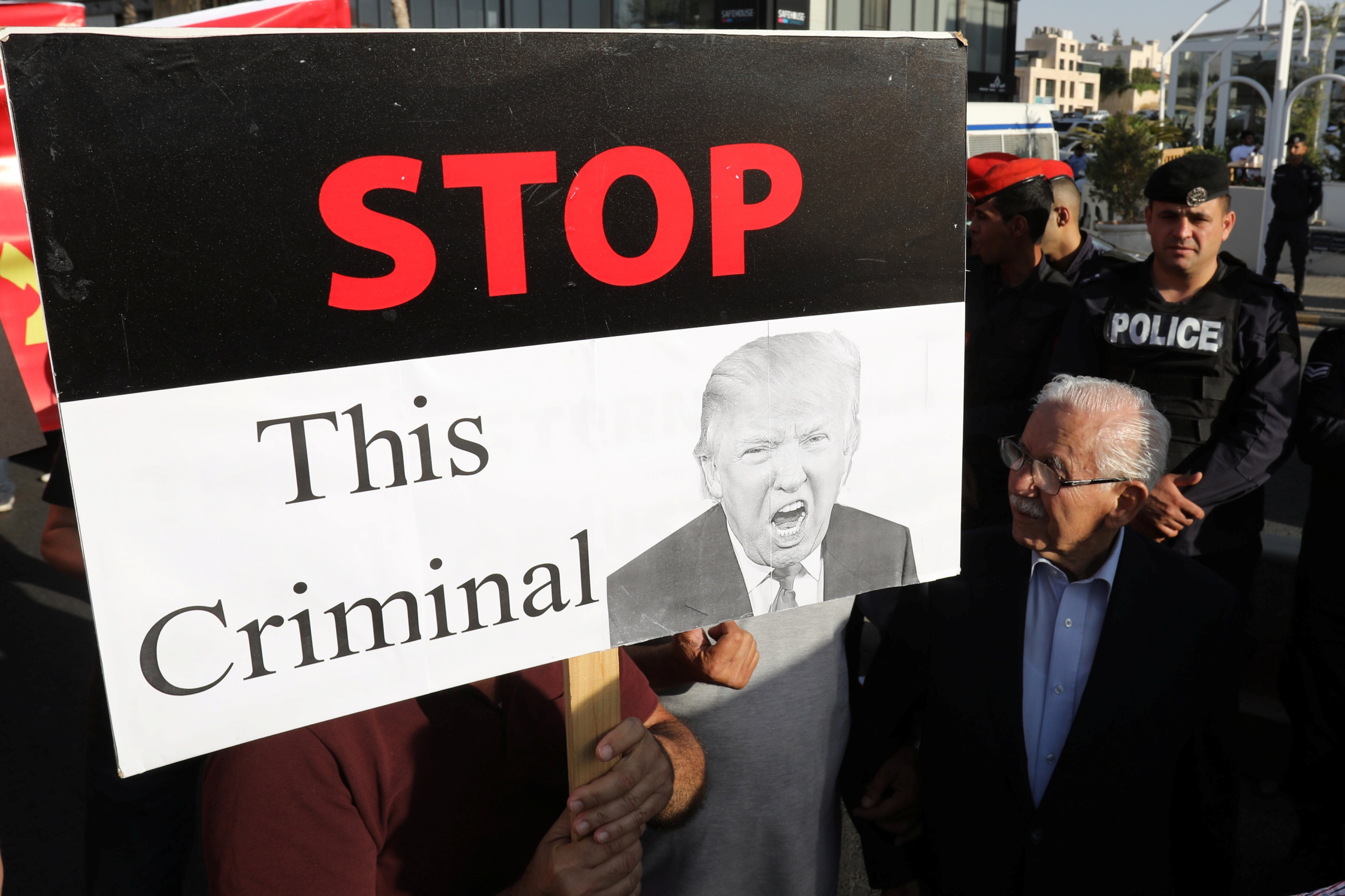
Jawad Dweedar, a 37-year-old Palestinian refugee, had a message he wanted Washington to hear, and it was scrawled across the placard he was holding: "Down with the normalizing auction in Bahrain".
The Palestinian from Baqaa camp was one of hundreds of refugees and Jordanians outside the US Embassy in Amman on Friday, railing against the upcoming conference in Manama set to launch the first phase of Donald Trump's proposals regarding Palestine, widely referred to as the "deal of the century".
Trump's deal, or peace plan, is designed to settle the Israel-Palestine conflict once and for all, starting with economic incentives for the Palestinians that are to be laid out in Bahrain on Tuesday.
Critics have lambasted the US president's initiative, saying it is heavily biased in favour of the Israelis, and on Friday the plan's opponents flocked to Amman to protest in response to a call by leftist and nationalist parties.
Dweedar's family became refugees during the 1948 war in which Israel was created. He feels that there is a real danger he will not be able to return to the lands from which his family was expelled in the conflict.
New MEE newsletter: Jerusalem Dispatch
Sign up to get the latest insights and analysis on Israel-Palestine, alongside Turkey Unpacked and other MEE newsletters
"We come from all Palestinian refugee camps and participate in this march to declare our opposition to the conspiracies against our people and insist on our right of return," he told Middle East Eye.
Under severe international pressure, the Jordanian government has said it is considering the White House's invitation to attend the controversial conference.
"We are studying the invitation, and, if we attend, we would go to express our steady and unwavering position by having a positive interaction," Jordanian Foreign Minister Ayman Safadi said this week.
But Dweedar wanted to send a message to the government, calling on it to reject participation in the Bahrain workshop and not accept foreigners' commands.
"We need to hold on to our national sovereignty and reject the dangers inherited in this plan on Jordan," he said.
Dweedar said Trump's proposals seek to turn the Palestinian cause and the Middle East conflict into a simple economic issue, trying to collapse several important unresolved issues into a matter of money.
"This is in total contradiction to the reality, which is that this is a struggle over the land and the Palestinian Arab presence," he said.
Arab participation
Several Arab countries, including Saudi Arabia, the United Arab Emirates, Qatar, Egypt and Morocco, have said they are attending the summit, which Dweedar labelled a "normalisation" conference.
"The Arab participation reflects how much these countries have become lackeys to the US administration in the absence of the Palestinian side, whose cause the conference is about," he said.
The leftist demonstration saw the participation of political, union and party activists, and was dubbed "Anger Friday".
The Arab participation reflects how much these countries have become lackeys to the US administration
- Jawad Dweedar, protester
Protesters criticised Saudi Arabia and its stand towards the Palestinian cause, chanting: "Listen oh Saudi, why do we blame foreigners when your petrol is like water to Americans."
Another chant called Saudi Crown Prince Mohammad Bin Salman an American collaborator.
Protesters also called for the opportunity to attack Israelis and for Jordan's king to open the country's western border: "Oh, Abdullah son of Hussein, open for us the borders with Palestine."
Another chant dealt with Jerusalem. "There is no east or west Jerusalem, it is all 100 percent," demonstrators cried.
Signs picturing the United States as the head of a snake were held high, alongside others that read: "The deal of the century will not pass," "Down with the Bahrain auction" and "The embassy staff is all CIA".
Omar Awad, a spokesman of the Jordanian Communist Party, told MEE that the aim of the protest was to send a clear message.
"We want everyone to know that the US is violating international law by giving Jerusalem and the Golan to the Israeli occupiers without any right," he said, referring to Trump's recognition of the holy city as Israel's capital and Israeli sovereignty over the occupied Syrian Golan Heights.
"Our second message to the Americans is that the Jordanian people still see American policy as hostile in regards to the rights of the Palestinian people, with the aim of negating the Palestinian cause," he said.
"We have returned to the old formula of Western imperial money forming an alliance with the reactionary Arabs and Zionists. Gulf states are running after the occupiers in an act of normalisation with the Israeli occupiers, the first chapter of which is the deal of the century."
Said Diab, secretary-general of the Popular Unity Party, told MEE that the Jordanian government must be in sync with the population.
"The people are against the Bahrain workshop, therefore any participation is a slippery slope that will lead to the deal of the century."
Islamist march
Before the leftist protest, another demonstration organised by the Islamic Movement in Jordan took place. A 3,000-strong march began at the Husseini mosque in central Amman after Friday prayers, under the title: "No to normalisation and the sale of homelands."
The protesters marched through the Jordanian capital's centre.
Participants in the Islamic rally raised placards highlighting Jerusalem, waved Palestinian flags and decried Jordan's 1994 peace agreement with Israel, chanting: "Down with the Wadi Araba treaty. With blood and our souls, we will redeem al-Aqsa and will not succumb to Americans."
They also chanted: "The people of Jordan and Palestine reject the Bahrain deal, Jordanians will not forget that they are custodians of al-Aqsa," referring to the mosque in Jerusalem considered the third-holiest site in Islam.
Though both protests were united in their condemnation of the Bahrain summit, they were separated by differing stances on the Syrian government.
With patience and perseverance we must unite to face up to the challenges that aim at liquidating the Palestinian cause
- Abedalh Akaileh, Islah politician
On one hand, the leftist and nationalist parties are supportive of Damascus, while the Islamists back the Syrian opposition, keeping the demonstrations apart.
Muath Khawaldeh, a spokesman of the Muslim Brotherhood in Jordan, told MEE: "The goal of the rally is to restate the popular Jordanian position about participating in the normalising Bahrain workshop, the loss of Palestinian rights and the beginning of the economic march towards the deal of the century."
Khawaldeh said participating in the workshop means parties have already accepted the US plan.
"Today we are going out to reiterate the basic position of Jordanians in rejecting the deal of the century and any activity that is a prelude to it. We will not allow Jordan to be part of this deal," he said.
Abedalh Akaileh, the head of the Islah bloc in Jordan's parliament, addressed the protesters, saying Palestine is not for sale or negotiation.
"We are sending multiple messages. One is to the king, who [has] repeatedly told the people, the army and the parliament that he is against the deal of the century and that he will not compromise on Jerusalem," Akaileh said.
"We tell him to continue his position even if the pressure is increased. If there is pressure, Jordan needs to widen its alliances with Turkey, Qatar, Iran and Pakistan."
Akaileh said Jordan is hinting that it favours the Bahrain workshop.
"How can we be for a conference rejected by Palestinians, Lebanese and Iraqis? We should have rejected it because it is a conspiracy against us," the Islah politician said.
Akaileh addressed the Jordanian people saying: "With patience and perseverance we must unite to face up to the challenges that aim at liquidating the Palestinian cause."
Protesters replayed a speech by the late deposed Egyptian president Mohamed Morsi talking about Palestine and Jerusalem. Morsi died suddenly on Monday after collapsing in court in Cairo.
The Islamist crowd responded by decrying the military rule that replaced Morsi in a 2013 coup, and describing the toppled president as a martyr.
At the end of the rally, the protesters held a prayer for Morsi's soul after reading Quranic verses on behalf of the former president and those killed for the Palestinian cause.
Middle East Eye delivers independent and unrivalled coverage and analysis of the Middle East, North Africa and beyond. To learn more about republishing this content and the associated fees, please fill out this form. More about MEE can be found here.


